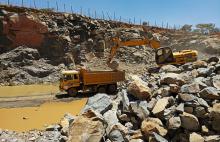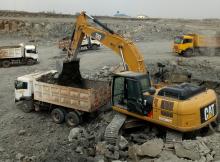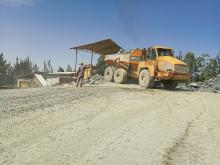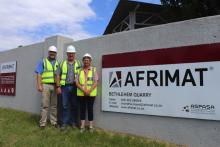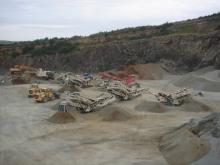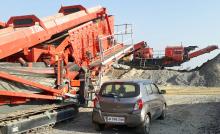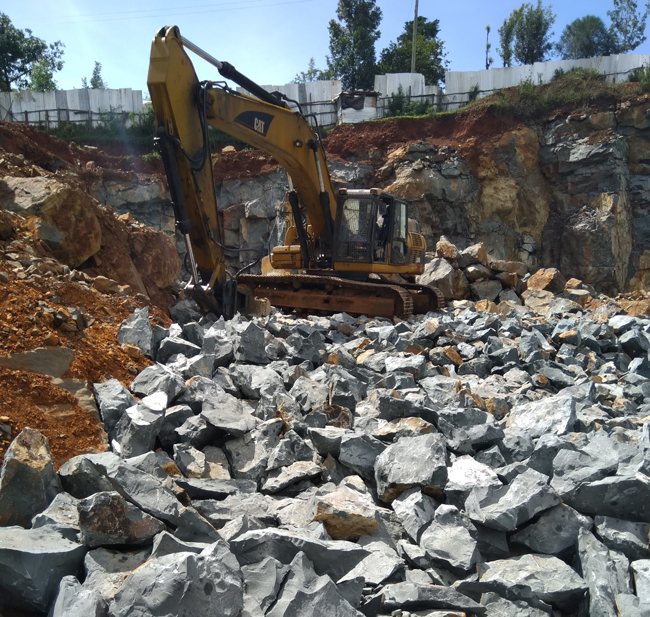
Kisii county in western Kenya is full of highly successful small to medium-sized aggregates quarry operators. Shem Oirere went to visit one of them.
Around 150 kilometres from Lake Victoria, Kisii county is one of the counties in western Kenya where small and medium construction material suppliers are thriving and local quarries, despite their small size, are reporting booming business as county-based construction works continue expanding.
“The rate of construction in all counties is on the rise as county governments allocate more funds for infrastructure development with more private investors taking advantage of devolution to put up housing projects and expand hospitality businesses,” says Obed Mogambi, quarry manager at County 45 Quarry in Kisii.
The quarry has two sites, about 1km apart, for quarry mining and processing. Its aggregates production started two years ago after a local investor realised there was increasing demand for construction material in Kisii county, whose government has unveiled plans for new roads, better maintenance and expansion of existing highways, and the building of new schools to accommodate an increasing population.
“Ours is not among the biggest quarries in western Kenya but we have managed to grab a huge share of the Kisii county aggregates market. We also have some of the market in neighbouring Homabay and Migori counties, where current demand for road construction materials is at its peak,” said Mogambi.
Located 5kms from Menyinkwa on the Kisii-Kilgoris road, County 45 Quarry operates eight hours a day. Mineral products processing starts with removal of the top soil at the quarry site, in preparation for drilling.
“We remove the top soil, with either a
He said with the top soil removed and deposited on selected sites, either for landscaping or reforestation of areas close to the quarry, quarry workers then drill 30ft deep blast holes which he says are designed “to ensure the direction of throw of the blasted rock is the right one to avoid any injuries among quarry workers.”
In addition, Mogambi said, the design of the blast holes “can be in staggered arrays or patterned irregularly, or in a row, square or rectangular depending on the mapped direction of the throw of the blasted rock.”
To create its blast holes, County 45 Quarry uses a K-323 crawler excavator drill manufactured by Indian rock drill machines and spares company KSC Group. The 2.7tonne, up to 144mm diameter hole drill has been used in the quarry since it launched operations, which Mogambi says has served the quarry well.
He continued: “We use ammonium nitrate mixed with a small portion of diesel and gelignite for blasting after the drilling of the rocks. These are ingredients that are readily available, have a low-cost implication and easy to mix before use.”
Mogambi said it takes 24 hours before work on separating portable rocks from boulders begins. “This allows for the dust and the smell of ammonia to clear. The boulders are broken further to make it possible for our Howo Sinotruk dump trucks to carry, while rocks of the right size are hauled directly to the primary crusher.”
Mogambi said County 45 Quarry currently deploys Howo Sinotruk 290H and 330HP dump trucks which, he says, have 16 and 30 tonne capacities, respectively.
“For processing aggregates, our company is currently relying on an impact crusher from Zenith’s Pf series,” he said.
“Some sections of our crushing system have been fabricated by local engineers, and it serves us perfectly well,” added the quarry manager.
The Chinese supplier-provided primary and secondary crushers at the quarry are second-hand but in good condition.
The Zenith impact crusher at County 45 is the 17tonne Pf 1210 model with a feeder opening of 400x1080mm and feeding capacity of 300mm. The crusher can crush up to 130 tonnes/hour using a motor power of up to 132kW.
“As a starting quarry operation what we needed was equipment that was easy to maintain and offered bigger capacity and reliable performance. We feel the current impact crusher has met our needs for now,” said Mogambi.
County 45 Quarry makes diverse construction material such as aggregate products sized 14mm-20mm, 10mm-14mm, 6mm-10mm and 0-6mm. The 14mm-20mm and 10mm-14mm is generally used for house building, while the 6mm-10mm grade products are for road construction.
The quarry also produces bricks containing on-site processed dust, makes and supplies road kerbs and channels, and wall and column copings of various sizes, depending on customer needs.
“The future of small quarries in Kenya looks good,” said Mogambi, citing the examples of Kisii and Homabay counties, where county governments have unveiled ambitious infrastructure expansion plans to 2021.
In Kisii for example, the county government plans to compact and gravel 500km of roads in addition to rehabilitating an additional 1000km of highways, building 45 footbridges and gravelling another 100km of roads in urban areas.
“All these projects require aggregates and quarries that are found within the county stand to benefit from these opportunities,” said Mogambi.
With Kenya’s national government continuing to allocate a fifth of the country’s budget to county governments, expansion of infrastructure across the nation’s 47 counties is expected to increase, providing great business opportunities for small yet highly ambitious quarries like Kisii’s County 45.

